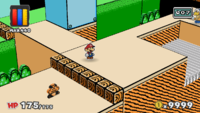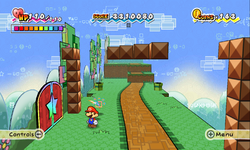Flip: Difference between revisions
AgentMuffin (talk | contribs) No edit summary |
AgentMuffin (talk | contribs) mNo edit summary |
||
| Line 7: | Line 7: | ||
[[Bestovius]] grants Mario the ability to flip dimensions, for the initial price of all the money in Mario's possession, although the player can negotiate for a lower price or for free by refusing Bestovius's offer. | [[Bestovius]] grants Mario the ability to flip dimensions, for the initial price of all the money in Mario's possession, although the player can negotiate for a lower price or for free by refusing Bestovius's offer. | ||
The technique is used by pressing {{button|wii|a}}. If Mario is no longer standing on ground after Flipping, he has the chance to jump once in midair and land on any nearby terrain. One segment of the | The technique is used by pressing {{button|wii|a}} while on the ground. If Mario is no longer standing on ground after Flipping, he has the chance to jump once in midair and land on any nearby terrain. One segment of the Flip Meter drains for every two seconds spent in 3D, and the meter gradually refills while in 2D. If the meter runs out, it deals Mario one damage and instantly refills without forcing him back into 2D. Taking damage or using a healing item also instantly refills the Flip Meter, and once Mario collects his own [[Catch Card]], the meter will never drain. | ||
Internally, levels in ''Super Paper Mario'' are segmented depthwise into panes. In 2D, everything in the same pane as the player character has its hitbox extruded, and the character may be snapped to a certain depth within the pane. The camera also uses a front view in {{wp|parallel projection}}, and panes far in the distance aren't visible. In 3D, the camera gains {{wp|Perspective (graphical)|perspective}} and rotates 90° clockwise horizontally, and hitbox extrusion and snapping are disabled. Objects are loaded based on distance from the player character, instead of whether they share a pane, and some objects too near or far from the camera will lose their textures and become translucent.<ref>aldelaro5 (June 2, 2016). [//aldelaro5.wordpress.com/2016/06/02/my-glitch-hunting-how-the-flipping-mechanic-in-super-paper-mario-works My glitch hunting: how the flipping mechanic in Super Paper Mario works]. ''WordPress''. Retrieved August 7, 2019.</ref> | Internally, levels in ''Super Paper Mario'' are segmented depthwise into panes. In 2D, everything in the same pane as the player character has its hitbox extruded, and the character may be snapped to a certain depth within the pane. The camera also uses a front view in {{wp|parallel projection}}, and panes far in the distance aren't visible. In 3D, the camera gains {{wp|Perspective (graphical)|perspective}} and rotates 90° clockwise horizontally, and hitbox extrusion and snapping are disabled. Objects are loaded based on distance from the player character, instead of whether they share a pane, and some objects too near or far from the camera will lose their textures and become translucent.<ref>aldelaro5 (June 2, 2016). [//aldelaro5.wordpress.com/2016/06/02/my-glitch-hunting-how-the-flipping-mechanic-in-super-paper-mario-works My glitch hunting: how the flipping mechanic in Super Paper Mario works]. ''WordPress''. Retrieved August 7, 2019.</ref> | ||
While Flipping into 3D solves many problems, it can also complicate tasks. For example, a straight line of [[? Block]]s in 2D can turn out to be placed at various depths in 3D. There are also flat objects, such as certain [[Block]]s, that can only be interacted with in 2D or 3D, being perpendicular to the camera and intangible | While Flipping into 3D solves many problems, it can also complicate tasks. For example, a straight line of [[? Block]]s in 2D can turn out to be placed at various depths in 3D. There are also flat objects, such as certain [[Block]]s, that can only be interacted with in 2D or 3D, being perpendicular to the camera and intangible when the player character is flipped into the other dimension. | ||
Flipping appears to affect a small area around Mario, as he is able to pull [[Red (Super Paper Mario)|Red]] back into 2D, and bring [[Thoreau|grabbed]] enemies between dimensions. Mario is also not the only entity able to flip dimensions. Enemies with a dotted rectangular border around them can also Flip, and will follow Mario into 3D to continue attacking him. Other enemies, such as the [[Cursya]], are three-dimensional to begin with. Some [[List of bosses|bosses]], such as [[Mimi]] and [[Dimentio]], can also flip. | Flipping appears to affect a small area around Mario, as he is able to pull [[Red (Super Paper Mario)|Red]] back into 2D, and bring [[Thoreau|grabbed]] enemies between dimensions. Mario is also not the only entity able to flip dimensions. Enemies with a dotted rectangular border around them can also Flip, and will follow Mario into 3D to continue attacking him. Other enemies, such as the [[Cursya]], are three-dimensional to begin with. Some [[List of bosses|bosses]], such as [[Mimi]] and [[Dimentio]], can also flip. | ||
| Line 17: | Line 17: | ||
===''Paper Mario: Color Splash''=== | ===''Paper Mario: Color Splash''=== | ||
[[File:PMCS Flip.png|thumb|left|The Flip technique in ''[[Paper Mario: Color Splash]]''. Note the 10 time units [[Flip Meter]] in the upper right corner.]] | [[File:PMCS Flip.png|thumb|left|The Flip technique in ''[[Paper Mario: Color Splash]]''. Note the 10 time units [[Flip Meter]] in the upper right corner.]] | ||
Flip returns in ''[[Paper Mario: Color Splash]]'', in an area based on ''[[Super Mario Bros. 3]]'' found in a monitor at the [[Green Energy Plant]]. It is now used by pressing {{button| | The Flip ability returns in ''[[Paper Mario: Color Splash]]'', in an area based on ''[[Super Mario Bros. 3]]'' found in a monitor at the [[Green Energy Plant]]. It is now used by pressing {{button|wiiu|y}}. It still has a 10-unit time limit, this time corresponding to 10 seconds instead of 20 seconds. The camera in 3D is also changed from a side view to a horizontally and vertically diagonal angle, with respect to the 2D point of view. | ||
Flipping requires a certain amount of each of the three colors of paint. When 3 seconds remain on the Flip Meter, the borders of the screen start flashing white; when the meter is empty, Mario is forced to return to 2D, but does not take damage. The Flip Meter instantly refills as soon as this occurs, so it is possible to reactivate Flip immediately thereafter, if Mario is carrying enough paint to do so. | |||
{{br}} | {{br}} | ||
Revision as of 11:35, August 7, 2019
- This article is about the move used in Super Paper Mario. For the Bonus Challenge in the Yoshi's Island games with the name usually shortened as "Flip", see Flip Cards.
Flip is a technique used by Mario in the Paper Mario series. At the push of a button, Mario goes from 2D to 3D, with the camera rotating to show depth. The Flip Meter imposes a limit upon the time Mario can stay in 3D.
History
Super Paper Mario
Bestovius grants Mario the ability to flip dimensions, for the initial price of all the money in Mario's possession, although the player can negotiate for a lower price or for free by refusing Bestovius's offer.
The technique is used by pressing ![]() while on the ground. If Mario is no longer standing on ground after Flipping, he has the chance to jump once in midair and land on any nearby terrain. One segment of the Flip Meter drains for every two seconds spent in 3D, and the meter gradually refills while in 2D. If the meter runs out, it deals Mario one damage and instantly refills without forcing him back into 2D. Taking damage or using a healing item also instantly refills the Flip Meter, and once Mario collects his own Catch Card, the meter will never drain.
while on the ground. If Mario is no longer standing on ground after Flipping, he has the chance to jump once in midair and land on any nearby terrain. One segment of the Flip Meter drains for every two seconds spent in 3D, and the meter gradually refills while in 2D. If the meter runs out, it deals Mario one damage and instantly refills without forcing him back into 2D. Taking damage or using a healing item also instantly refills the Flip Meter, and once Mario collects his own Catch Card, the meter will never drain.
Internally, levels in Super Paper Mario are segmented depthwise into panes. In 2D, everything in the same pane as the player character has its hitbox extruded, and the character may be snapped to a certain depth within the pane. The camera also uses a front view in parallel projection, and panes far in the distance aren't visible. In 3D, the camera gains perspective and rotates 90° clockwise horizontally, and hitbox extrusion and snapping are disabled. Objects are loaded based on distance from the player character, instead of whether they share a pane, and some objects too near or far from the camera will lose their textures and become translucent.[1]
While Flipping into 3D solves many problems, it can also complicate tasks. For example, a straight line of ? Blocks in 2D can turn out to be placed at various depths in 3D. There are also flat objects, such as certain Blocks, that can only be interacted with in 2D or 3D, being perpendicular to the camera and intangible when the player character is flipped into the other dimension.
Flipping appears to affect a small area around Mario, as he is able to pull Red back into 2D, and bring grabbed enemies between dimensions. Mario is also not the only entity able to flip dimensions. Enemies with a dotted rectangular border around them can also Flip, and will follow Mario into 3D to continue attacking him. Other enemies, such as the Cursya, are three-dimensional to begin with. Some bosses, such as Mimi and Dimentio, can also flip.
Paper Mario: Color Splash

The Flip ability returns in Paper Mario: Color Splash, in an area based on Super Mario Bros. 3 found in a monitor at the Green Energy Plant. It is now used by pressing ![]() . It still has a 10-unit time limit, this time corresponding to 10 seconds instead of 20 seconds. The camera in 3D is also changed from a side view to a horizontally and vertically diagonal angle, with respect to the 2D point of view.
. It still has a 10-unit time limit, this time corresponding to 10 seconds instead of 20 seconds. The camera in 3D is also changed from a side view to a horizontally and vertically diagonal angle, with respect to the 2D point of view.
Flipping requires a certain amount of each of the three colors of paint. When 3 seconds remain on the Flip Meter, the borders of the screen start flashing white; when the meter is empty, Mario is forced to return to 2D, but does not take damage. The Flip Meter instantly refills as soon as this occurs, so it is possible to reactivate Flip immediately thereafter, if Mario is carrying enough paint to do so.
References
- ^ aldelaro5 (June 2, 2016). My glitch hunting: how the flipping mechanic in Super Paper Mario works. WordPress. Retrieved August 7, 2019.
